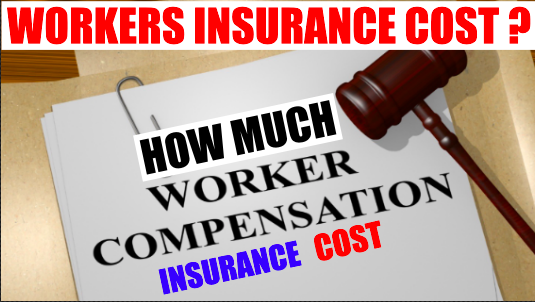Insurance Cost. Most clients with a total payroll of less than $300,000 pay an average of $70 per month for workers’ compensation insurance, also known as workers’ compensation insurance1.
It is important to know that the cost of workers’ compensation insurance varies from company to company. There is no standard cost because insurance companies consider a variety of factors when determining premiums. These include
- Salary
- Type of business
- Claims history
- Employee’s job title
Most states require you to carry workers’ compensation insurance when you hire employees. Laborers’ remuneration protection assists representatives with recuperating from business related wounds and sicknesses.
Workers’ Accident Compensation Insurance
What are the workers’ compensation insurance premiums for small businesses?
Workers’ Compensation Insurance CostsInsurance companies use different factors to determine workers’ compensation insurance costs, so the premiums paid by small businesses may vary.
- Average annual cost:2 $840
- Average monthly cost:3 $70
The formula that can be used to estimate workers’ compensation premiums is as follows
Workers’ Compensation Class Code Rate X Claims Experience Modification Factor X (Payroll / $100) = Premium**.
In certain states, guarantors might utilize an encounter alteration number or rating. This workers’ compensation rating is based on claims history. A company with an acceptable workers’ compensation claims history may have an experience modification number below 1.00; an experience modification number above 1.00 means that the company has a claims history.
Remember, this is a simplified formula. The best way to know your company’s workers’ compensation premiums is to get an estimate. Insurance Cost.
How are workers’ compensation premiums calculated?
Not all workers’ compensation premiums are the same. Factors that affect workers’ compensation premiums include Insurance Cost.
Pay-as-you-go workers’ compensation
Pay-as-you-go Workers’ Compensation calculates workers’ compensation premiums based on real-time payroll, which allows for more accurate premium payments. This reduces the likelihood of overpaying premiums throughout the year or having premiums* adjusted due to underpayment of payroll at the end of the coverage period.
State Requirements
Workers’ compensation laws vary from state to state. In most cases, businesses with employees must have workers’ compensation insurance, but there are exceptions. For example, small business owners in Arkansas with fewer than three employees are not required to purchase insurance.
It is recommended that you work with a business insurance professional to ensure that you understand and comply with local laws. Insurance Cost.

Number of Employees and Salaries
The more representatives you have, the higher your laborers’ pay expenses will be. This is because the workers’ compensation insurance premium calculation includes the amount of your business’s payroll. Premiums are calculated per $100 of payroll. In other words, the larger the payroll, the higher the premium. Insurance Cost.
Type of Employee’s Job ( Insurance Cost.
The higher the risk job, the higher the workers’ compensation premium. For example, an accountant has a lower risk of injury than a lumberjack. Higher-risk jobs with a higher likelihood of work-related injury, illness, or death have higher premiums.
How do workers’ compensation class codes affect premiums?
The National Council on Compensation Insurance (NCCI) maintains workers’ compensation class codes; NCCI sets class codes based on the type of work a worker performs to help insurance companies calculate workers’ compensation premiums. The more employees in a higher risk class code, the higher the workers’ compensation premium.
Worldwide Auto Insurance 2023 | Free Quote
Workers’ Compensation Costs by State
Workers’ compensation costs can vary widely from state to state. This is because insurance requirements and regulations can vary widely. Differences range from the number of employees required to be insured to whether insurance coverage is required for both part-time and full-time employees. Some laws may affect workers’ compensation insurance costs.
Some states do not require small businesses to carry workers’ compensation insurance. This means that if a company has fewer than five employees, it may not be required to purchase insurance. For instance, Alabama requires organizations with at least five representatives to convey laborers’ remuneration protection. Most states, however, require companies with one or more employees to carry insurance.
Some states also exempt certain employers from the insurance requirement. In New Mexico, real estate agents and ranchers are not required to carry insurance. Sole proprietors and business partners in New York State are also exempt.
Several states exempt family members who are employees from workers’ compensation insurance. In North Dakota, children under the age of 22 who work for a parent are not required to purchase workers’ compensation insurance. Insurance Cost.
Some states also limit where companies can purchase workers’ compensation insurance, which can affect costs. Four monopolistic states require companies to purchase insurance from state funds. This prevents these companies from obtaining quotes from private insurance companies. The four monopolistic states are.
- North Dakota
- Ohio
- Wyoming
- Washington State
What are the average workers’ compensation premiums?
But just as laws vary from state to state, so do workers’ compensation premiums.
How to Buy Workers’ Compensation Insurance at the Lowest Price
Purchasing workers’ compensation insurance may seem daunting. Because of state regulations, there are many factors to consider. And if you work across state lines, the process can be even more complicated. That’s why it’s important to work with an insurance company that has extensive experience in workers’ compensation insurance.
At The Hartford, we have over 200 years of experience behind us. Our Hartford specialists can provide you with workers’ compensation insurance and any other coverage you may need at the right price.
Contact us today to request a quote.
Last updated July 10, 2023
1,2,3,4 Premiums are based on monthly premiums paid by Hartford small business customers for 12-month policies between 1/1/21 and 12/31/21. Premiums may vary as they are calculated from a variety of factors specific to your business.
** This is an improved on estimation for instructive purposes in particular. Actual premium calculations may be more complex. Experience Mods are subject to state requirements and do not apply to all policies.
Who Pays for Workers’ Compensation Insurance Cost ?
Regardless of state, the employer pays for workers’ compensation insurance. The workers’ compensation premium is a percentage of payroll. Unlike health insurance, workers’ compensation insurance is not deducted from an employee’s paycheck.
Workers’ compensation insurance provides benefits if an employee becomes ill or is injured on the job as a result of work. Also known as workers’ compensation insurance or Workman’s Comp, this insurance is a type of business insurance. Your state may require you to have workers’ compensation insurance.
Employers may purchase insurance through a workers’ compensation insurance company:
Workers’ Compensation State Fund
Hartford and other private insurance companies
Some states require employers to pay workers’ compensation premiums through an exclusive state agency. Be sure to check what is mandated in your state and how you can purchase insurance.
For injured employees and workers with work-related illnesses, workers’ compensation insurance provides the following benefits
- Loss of wages
- Medical treatment expenses
- Ongoing medical expenses
- Disability leave
If an employee dies while at work, funeral expenses may be covered by workers’ compensation insurance. Insurance Cost.
Who pays for workers’ compensation insurance?
Who Pays for Workers’ Compensation InsuranceAs a business owner, it is important to work with an insurance company you can trust. We have more than 200 years of consolidated insight. We know the unique risks that small businesses like yours face.
That’s why we created our small business insurance team to help you move your business forward. By working with a private insurance company like The Hartford for your workers’ compensation insurance needs, you will benefit from
- Insurance solutions customized to your business needs.
- Personalized attention and service
- A claims management approach that helps employees return to work sooner
- Programs to help keep your business and employees healthy
- Flexible pricing and billing solutions to help you manage your finances
The Hartford provides workers’ compensation insurance to businesses that cannot afford to pay premiums on their own.
Workers’ compensation insurance rules and regulations vary from state to state. Most employers purchase workers’ compensation insurance through a private insurance company like The Hartford to comply with state laws. A Hartford specialist can answer your questions and help you obtain the coverage your business needs. Insurance Cost.
However, with the rising cost of workers’ compensation insurance, many large employers are opting to self-insure. By self-insuring, employers may be able to reduce costs. Employers that self-insure are still in compliance with state workers’ compensation insurance regulations. The difference is that these employers are responsible for paying for their employees’ coverage.
Self-insured workers’ compensation payments are not so simple.
Who Pays for Workers’ Compensation InsuranceThe workers’ compensation insurance process is not as simple for large employers that are self-insured. Typically, many companies that are self-insured do not process claims on their own, which means that more parties are involved.
They usually work with a third-party organization (TPA) to handle the paperwork and workers’ compensation procedures. They may also need to work with an attorney to ensure that the company is complying with workers’ compensation laws. Learn more about workers’ compensation payment options.
If you are a large company planning to self-insure, we can still help. Contact us today to learn how our team can assist your business with your workers’ compensation needs. Insurance Cost.
Have a private insurance company pay your workers’ compensation premiums
Small business owners pay premiums to insurance companies for workers’ compensation coverage. Insurance companies provide workers’ compensation benefits when an employee is injured or becomes ill on the job. Insurance Cost.
Contingent upon your state, entrepreneurs might decide to work with a confidential insurance agency as opposed to a state-run organization With more than 200 years of involvement, we comprehend that every company has unique needs.
Get a quote today. You can also call us at 855-829-1683.
